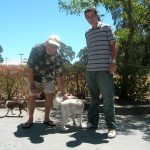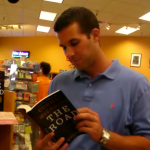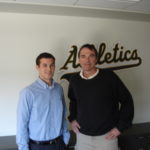Interview: How To Become a Professional Musician
I like what you guys are doing. Especially with bluegrass. The scene out here is unlike anything I’ve ever seen.
The scene is ridiculous man. It’s the one real oral tradition of music that there still is. Is has everything to do with the fact that you guys saw at the IBMA conference, people from all over the world get together and over the course of a week, just make all this music together and share in all different facets of the music besides just playing. And that stuff happens at bluegrass festivals across the country every weekend, all year, all over the world really.
Why is bluegrass like that and other genres aren’t?
Really because you can bust the instruments out and play them. You don’t need amps. And also, when I say oral tradition, the deepest influences of that music are all the forms of music that proceed bluegrass are also oral traditions. You’ve got fiddle music from the British Isles. You’ve got blues music that originated in the deep South. You’ve got all the African music that came over in the 1800’s with the slaves. You’ve got all the Appalachian forms of music that took bits and pieces of all of those. When some of that music started to intersect with professional music, that’s when the whole thing started. When all those forms of music that proceeded bluegrass, they were just learned by people passing the music down. You learn the songs from ancestors, friends, whatever. But its not a form of music that really exists on paper like classical music or the jazz cannon. That’s all in the book with charts. Or pop music which is continuously reinventing itself to stay on top of commercial thing. Bluegrass is real roots music that lives and breaths all the time.
That’s crazy because my stereotype of a banjo player was like Toothless Joe. But you’re definitely not like that. You’re a Dartmouth graduate and articulate. How did you get started playing the banjo, and how did this whole journey begin?
There’s a lot of music in my family. But not so much in my father’s generation. My father’s parents were second generation immigrants from Italy and they started the Connecticut Opera Association in Hartford, CT. My grandmother was an accompanist and played the piano. My grandfather was a voice coach. He passed away before I came, but my grandmother grew up with us. I took piano lessons and there was always music around. Never it took with me where I became heavily involved with me in any capacity.
When I was in high school I started to discover popular music I was really into. My older brother was a musician. He turned me on to Frank Zappa and some eclectic rock. He was a bass player and played progressive rock. So he was into Zappa, Morphine, Faith No More, and some cool alternative punk bands that were kinda one step removed from the real mainstream.
He got into the Flecktones because Baylor Wooten. He played this stuff for me. I was just so into it. I just thought, I don’t know, I just listened to it and it blew me away. We started going to Flecktone shows with my older brother. Over the course of about two years, when I was a junior or senior in high school, I went to ever Flecktone show that was within a three, four hour drive of where I lived, just north of New York City. I saw probably or forty or so shows. I couldn’t get enough.
They played at the Knitting Factory in Tribeca of New York City in 2001. They played three nights, two shows a night, and I went to all six shows. The last night, I was sitting right up on the stage and Bela’s feet were right there. I was just so transfixed.
I went out the next day and bought this cheap banjo from some guy out of his garage. I didn’t know what I was doing, but my parents agreed to buy me a banjo for my high school graduation. So I bought my first banjo for $200 bucks or something. It was a total piece of junk. I had no idea what to do with it. I had no idea what bluegrass was. But, I was so into it. I played for hours everyday.
Little by little, I met some people in the first few months of when I was playing and they steered me towards bluegrass and this one particular book that teaches bluegrass. And, I just was like, I couldn’t get enough of it. I would play all day, every day.
Then I went to college and started playing a few months before my freshman year at Dartmouth. I just kind of got more and more into it. Before I had any business really playing, I decided this was the only thing I could do. I finished my major real early and started studying music. I took my junior year off and went to San Francisco to study with this music teacher out there, I guy named Bill Evans, who is a great teacher. He got me hooked up with some opportunities. Then I just kept working at it and working at it.
When I was finishing up Dartmouth, I decided I would try to pursue music. I knew that I didn’t have the chops to come to Nashville and cut it or whatever. So I applied and I was the first ever banjo principal at the Berkelee College of Music in Boston. That was really cool because I’m sort of unique in the way that I took a theoretical approach to the banjo. I was really interested in the progressive end of the spectrum. But it was just all about practicing and playing and getting better.
I spent another year in Boston after I was done playing at Berklee. I just started meeting some people, and little by little I met a few of the guys who are in the Infamous Stringdusters. Ultimately I just moved to Nashville and started attacking the careerist aspects of what goes into it.
But what got me into it was just, I just, I had never had anything in my life that I was even remotely as interested in as I was in music. And even more specifically, just this instrument. Just the sound of this instrument. Working on playing this instrument and fitting into my idea of a certain style of music.
I moved to Nashville and got this band started and the rest is history. I don’t know.
So it seems like you decided at a pretty young age that the banjo was for you. Playing music professionally was your dream. Was there ever a point where that decision wavered? Like you should be doing something else? Because going to a higher education university, there had to have been people around you that were going into investment banking. What was your major real quick?
Environmental studies. And before I was into playing banjo, I was big into fly fishing. I worked as a guide. I was working as a part of this outfitter in Montana. I was big into being a conservationist and running my own outfitter. I went and did that and I hated it. It took all the cool things out of the solitude and zen aspects of being out there and doing that thing yourself. So I bailed on that.
I was 18 when I started playing banjo. I probably, I mean, I was 18 when I started playing and it wasn’t but a few years later that I decided I would chase this as far as it would go. But all along, like you said, I had people, all my classmates at Dartmouth were going to work for investment banks or they were going to law school, med school, but I never really thought twice. I was pretty unafraid at that time. I wasn’t thinking practically about what went into it.
But ultimately, when I got through Berklee and I started to at least formulate an idea of what it would take to have the kind of career that I thought I…we’re about to get interrupted here.
But starting to get an idea of what kind of career would be worth doing. That was like a whole different thing. Figuring out an idea that would be really worthwhile. And what kind of lifestyle I wanted to have. It seemed it would really take the fun and all the kind of amazement out of music to try and hack it for years and years and pound the pavement and play gigs. I had an idea of what I wanted to do. I really wanted my career as a musician to be centered around being in an ensemble. And being in an ensemble that I really cared about and enjoyed being with.
Had you played in ensembles before?
Yeah, yeah, I did a fair amount of fairly high profile touring before the Stringdusters got going. But you’re asking about whether there was a time when any of that came into doubt. There definitely was.
When I first moved to Nashville our dobro player got hired by Dolly Parton. I remember thinking if the Stringdusters really going to happen. Then subsequently, ‘If it doesn’t, then is trying to be a professional musician exactly what I want to do?’ I wasn’t so sure about that. I knew that I could go back to school or do some other things that I thought would really interest me without running the risk of trying to force a career in music when maybe that multifaceted side man type of career wasn’t necessarily for me. I wanted to like, be a part of something that would really do something significant.
And another big incentive for me was having the potential of owning and running my own business with several partners. Being in control of something that I thought was going to go somewhere. I had definite times where I was in Nashville and I didn’t have two pennies to rub together. I was just sitting around practicing all day. Just daunted by everything that was around man. This place is such a mecca for players. It’s just crazy. People from all over the world just move here and they’re the best musicians anywhere. And you’re up against that all the time.
I had a time where I thought, ‘Is this really what I’m going to do?’ But it did work out.
So was it something as practical as having the lease to your house and you couldn’t leave? Or was it something that you loved so much and you were playing all the time and you enjoyed it so you stayed?
I knew I had to give it a shot. I had moved here. I had signed a lease. Whatever. I knew I had to give it a real go. When I say that, I really had to give the band a chance. I had to give this project a chance to get off the ground. Ultimately it did.
But what kept me here was the prospect of that happening. More than anything. Because if that was to completely die and I would have to start looking for the next thing, I might have thought twice about staying here. I don’t know. Maybe something else would have came my way, or maybe I would have had a change of heart. But that was really what I was chasing the hardest more than anything.
That’s crazy that you would make that type of decision to pursue your dream so much that you would come to Nashville, leave your east coast behind, because Boston and Nashville are completely different opposites, and once you got here you started to question that decision.
Yeah.
That’s interesting to look at.
They’re different. But if you really want to be a full time professional musician, Nashville…you have to be here. The industry is here, so when you know you can do all these different things without being…if you were to live in Colorado and start a band, that band would be your subsistence. But if you’re in Nashville and you play in a band, you can do session work, and you can pick up days to play with other bands and do all these things to fill in your schedule and supplement your income or your living, but still working on your career because those things are musically related. You don’t really have a choice.
Most of the really great musicians I’ve met are like, semi-geniuses in a way. I’m not surprised that a lot of you are educated and are extremely intelligent individuals. It’s not an easy skill to get. I guess the question would be how much of what you do is talent, and how much of what you do is practice? Can anyone practice to be a musician? Or do you have to have an innate ability? Do you have to be a genius?
I know that I’ve taught enough to know that people will probably not be professional musicians. No matter how hard they practice. But that said, I believe in people just chasing what they’re after. If you’re undaunted of being able to achieve a really high level of success.
But that said, it’s a combination of things. All musicians are different. You see some guys who have unlimited raw talent but have no discipline. You have some guys who have a lot of discipline, but don’t have the most innate sense of music. But they work really hard and hustle really hard. We all know that the music industry is not a perfect meritocracy. It’s not totally fair. The best bands don’t always rise to the top. You see bands that have ridiculous success, and they’re not the most skilled genius musicians out there.
You see people with all different balances of those two ingredients. But, one of the coolest things about the world I’m involved in with the whole acoustic bluegrass music world and the progressive edge of that all is that the musicians are ridiculous. I mean, they’re so talented. The talent level is just incredible. And everyone has their own voice. There are really interesting innovations happening over time with different styles of playing and the different instruments. And the bigger scope of the style of music and the influences coming in. So it depends.
But what you say is true about there is some correlation between the intelligence and the playing even though the stereotype is of someone who is very uneducated. But the guy who plays mandolin in our band, Jesse Cobb, he is the most natural musician I’ve ever played with. We play music, and everything he plays just fits together. It all makes sense. He’s got a very powerful and also very eloquent voice on his instrument. And he dropped out of school in seventh grade. Basically was on his own from the time that he was about 16. He has no real formal education, certainly no higher education, but is one of the smartest people I’ve ever met.
The musical opportunity is amazing that way because it doesn’t discriminate. People who have that voice and that intelligence, it’s apparent. You don’t have to prove it. What I say about this music world being a meritocracy, you come down here and all you have is your playing. You don’t have a resume in this world. No nothing. Credentials are important, but ultimately, you’re judged by the way that you play. You stand alone that way. And that’s weird man, coming from a place like Dartmouth where everyone is saying you have to get your undergrad degree so you can have this piece of paper waiting in the wings to fall back on. Well, that has never…
It’s that facade kind of. You either have it or you don’t.
Exactly. My diploma has never done anything for me. In fact, a lot of the time in this world I don’t even share with people.
Because it means nothing.
Not only does it mean nothing, but I find sometimes that in these circles there’s a bit of a stigma attached with being privileged. A lot of these people have worked their asses off to get to where they are. But in that regard, I have too. Everything I did was by design. I decided I would do this and I just did it myself. People don’t realize that it’s a totally different thing than any of my upbringing or going to private school or an Ivy League college. None of that stuff even relates to anything I’ve done with music. It’s weird. It’s a bit of a dichotomy that way, but I wouldn’t trade it for anything.
Do you ever wish you had gone to play more? Or do you think the education you got there is as important as…
I do think the education is important. But even more so than the education, the experience of spending four years at a place like that and what happened to me as a person. And the people that I met. That was just the time in my life where I sort of became who I am. For some people it happens earlier than others, and for me it was at that time.
Sometimes I wish I would have started playing sooner, but really, in retrospect, I started at a good time. I started at a time where I felt like definitely the most inspiration I could have possibly felt. I just felt this amazing amount of inspiration and excitement of getting into music. And I started then. That was just a good time to start.
So you’ve been on magazine covers. You’re about to go out to California and do five shows at the other end of the country. You just won three IBMA Awards. What gives you the most enjoyment out of this whole thing? This whole pursuit and what you do for a living?
It may sound or feel superficial a little bit, but this whole past week with the IBMA awards, I didn’t really have the most expectations. But that was so cool. That’s about more than just the music we make. It’s about the music that we make and the business that we run too. It’s really both. We all have a big stake in both of those things. That was a real honor. I was surprised to feel as flattered as I did. To feel successful and validated in that way, that’s a really good feeling.
To me, it’s still just about every day playing music. I practice music now more than I ever have in my life. I play a couple different instruments. Mostly banjo and drums for eight or nine hours every day. It just gets cooler every day. It gets more interesting every day. Those are the things that I enjoy.
I look forward to making our new band album. I look forward to making my new solo album. I look forward to all these career things. They just add up to affording yourself the opportunity to see what kind of music you can make, and how good you can get. What kind of mark you can leave.
That is like the initial inspiration, and still the thing that gets me the most fired up everyday. Just the ability to create and do that for a living. It’s the most amazing thing ever.
I don’t know if it will ever stop for you.
I hope not. I should get insurance on my hands.
What kind of goals do you have now? To a certain extent, you’ve reached a certain pinnacle by getting those awards. You’ve got a lot of respect in your community. Do you think about things like, ‘Are you trying to reach a broader audience? Do you want to play in different arenas? Do you want to try and write different songs?’ As an artist, what kind of goals do you have once you hit that point where, in your own community, you’ve reached the top?
We want to grow our band so that it becomes the center of everyone’s career, but also something that there’s enough demand for that we don’t have to play a 140 shows a year. Which is what we’re doing right now to really develop that. To get to where we can be more selective with the dates and have more of a multifaceted career.
For me, my goals definitely include collaborating with a wide variety of musicians. I’ve got a bunch of different people who I really admire and respect who I would love to play shows with or do recording projects with. Just put different things together. And also, on the same token, just work as a producer. And maybe if it’s not for projects of my own, I’d love to get into producing and helping musicians and bands create the best music that they can. It’s really got something to do with communicating with people and being able to articulate musical ideas. That’s something I’d love to get involved with.
My main goal still definitely involves the Stringdusters. It’s like a dream come true opportunity. Best guys, best musicians I’ve ever played with. Just to push that as far as it can go and really do something original. That’s the biggest goal there is.
When you’re up there on stage, rocking out in your own world, how would you describe that feeling to someone who has never had it?
It’s different on different nights. But on a really good night, on a really great night, the feeling is like you can’t even explain what it’s like. It’s not the kind of thing you can remember very clearly. The best nights seem to be the nights that when you get off stage, you can’t piece back together what just happened. You’ll have nights where you’re trying to play and Bela Fleck is sitting in the front row. You’re just all up in your own headspace. It just runs between the whole range of those things.
But when you’re on, and you’re able to turn off all the interference, and let a real stream of consciousness go between your creativity, your ideas, everything that’s in your head out through your hands to the instrument, it’s just like, that intoxicating feeling that keeps you wanting to do it all the time. It doesn’t happen all the time.
They say that the best, most natural improvised musicians are actually only improvising less than five percent of the time. The rest of the time you’re just rearranging the ideas that you know and putting them together in a logical way that fits in the physical form. But when you hit that tiny sliver of light where it really flows, man, that’s just, you can’t even believe it.
And sometimes that comes on stage. The nice thing about bluegrass is that you have all these opportunities to play informally when you’re not on stage. It could really happen at any time. It’s amazing man. It’s the thing that keeps you coming back.
It’s crazy that you say that because I was talking to Todd {Emily’s roommate, a dobro player}, and that feeling, I’ve had it in some other things, not necessarily music, but once you get the ability to improvise in anything you do, that is kind of like a whole new sensation. All of a sudden there’s nothing methodic about it. You’re not thinking about it. It becomes very natural. And you’re playing around. It’s a really crazy feeling to have.
Improvising in anything is pure creativity. Creativity on the fly. It’s not always, there’s never a guarantee that what you’re doing is pure creativity. When you’re seeking after that improvising in whatever it is, the door is always there to open to something that’s totally fresh. It’s not the fact that you’re always in there, but it’s the fact that the opportunity is there.
Even though you don’t hit it all the time, you can make all kind of analogies. In sports, like golfers say, one great shot is what keeps you coming back. It’s not that it’s there all the time, it’s that the ability for it to happen is always right there.
When you get better, it will happen more often. It’s the ability to make distinctions real acutely. All of a sudden you can control that ability to hit that zone more often.
The better you get, you’re always your own harshest critic. The better you get, the more critical you are of yourself. The more you want a return from yourself, it’s a never ending thing. It’s a lifelong pursuit of…you’re always close, and you just keep getting closer. It just never ends.
So one question we close out every interview with is if you could go back to when you were just exiting school and graduating, and give yourself one piece of advice, what would say to the 22, 23 year old Chris?
Oh man. He was a lot braver than the current version of me (laughs). I would like to see what he would say to me. To be honest. Seriously, I would go back there to see what he would say because the funniest thing about music and one of the reasons why it’s more profound for me now than ever is because I got to a point in my professional career where I became very daunted and very self critical.
I put really high expectations on myself. And maybe even sometimes I think back and I might have put myself in a position of pressure and professional expectations that maybe it was too soon. Maybe I needed more time. I was always a motivated person, so I did it without even thinking about it. I wasn’t reserved.
But I’d be curious to catch a glimpse of that feeling because it becomes fleeting the more pressure you put on yourself. And I’ve actually found in the last two months I’ve made an amazing jump forward on banjo because I’ve started playing another instrument that I’ve never played before.
I bought a drum kit. I’ve been playing drums like, all day every day. It’s helped me almost go back in time and rediscover what it feels like to be learning a new instrument. And so unafraid of the conventions. No pressure. No professional expectations. Just this new outlet.
Knowing everything I know about music, it’s fairly easy to tap into what the important elements are. It’s easy to practice because there is technique involved with any instrument. But I’m able to refeel that feeling a little bit. Of like, the fresh energy of what it’s like to learn something. Man, that is the most potent feeling ever.
When you’re not afraid, and you’re just chasing after something, and you don’t know any better, man you’re just like unstoppable.






